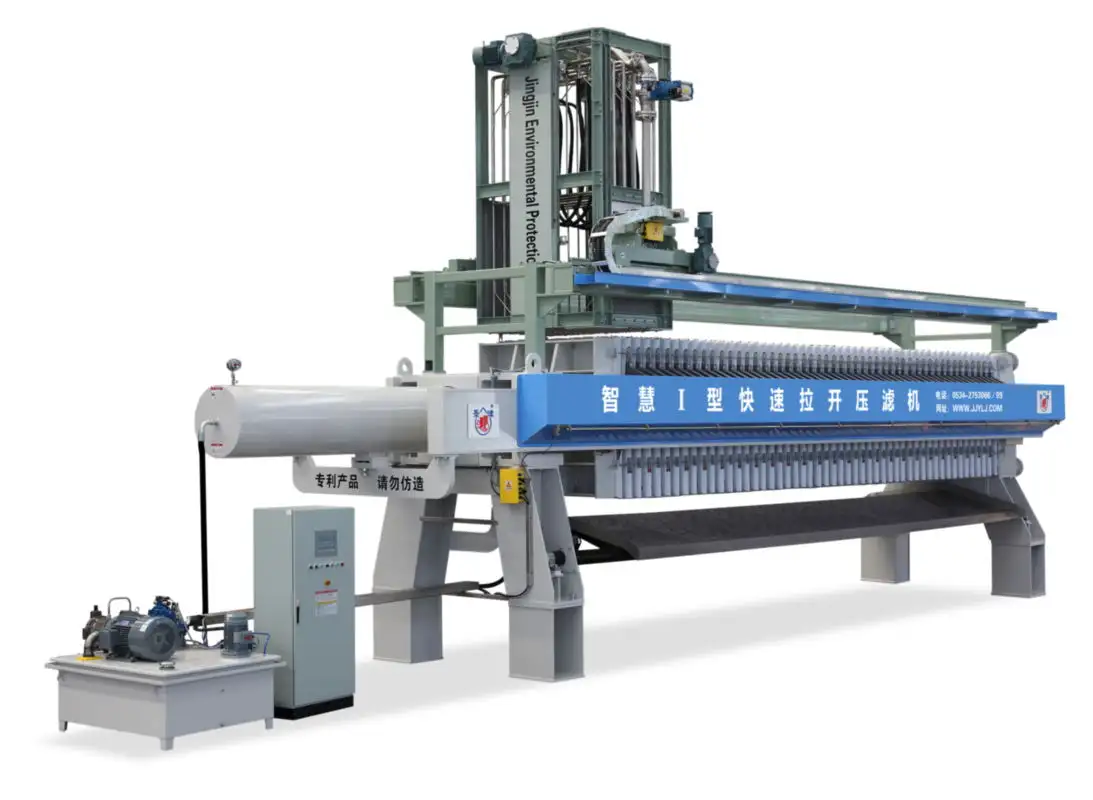Belt Filter Press Overview: Operation, Manufacturers, and Price Considerations
Nov 6, 2024
A belt filter press is an essential machine in the industrial dewatering process. It’s mainly used for separating solids from liquids in wastewater treatment plants and in various other industries like food and chemical manufacturing. The machine has a simple yet highly effective design, relying on gravity and mechanical pressure to squeeze out water from the sludge or slurry.

Belt Filter Press Operation
The belt filter press operation is based on a straightforward but efficient process. The slurry or sludge is first fed into the machine, where it is spread across a wide, porous belt. In the first stage, the material moves through the gravity zone. This is where gravity works to remove the initial portion of free liquid from the material.
Next, the material enters the press zone. In this stage, two belts squeeze the material between them. These belts pass through a series of rollers, applying mechanical pressure that forces out even more water. The material continues to be pressed until it reaches the desired level of dryness.
After this stage, the output is a relatively dry solid, ready for further processing or disposal. This is especially important in industries like wastewater treatment, where managing sludge disposal is a key challenge.
The belt filter press is valued for its consistent performance and high dewatering efficiency. It requires minimal operator input after setup, making it a convenient choice for large-scale operations.
Belt Filter Press Manufacturers
When looking for a belt filter press, it is crucial to choose a machine from trusted belt filter press manufacturers. Reputable suppliers ensure high quality, durability, and customer support. One such manufacturer is Jingjin, a leading name in the filter press industry. Jingjin is known for producing robust and reliable dewatering machines designed to handle even the most demanding applications.
Jingjin has years of experience in providing customized belt filter press systems that meet the specific needs of their clients. Their machines are built to last, with features that optimize performance and reduce downtime. Additionally, Jingjin offers excellent after-sales services, including installation and maintenance support.
Other leading belt filter press manufacturers also offer a range of machines, each with its own set of advantages, depending on the application. Some may specialize in producing large-scale presses, while others might focus on more compact or specialized designs. It is important to assess the manufacturer’s reputation, the quality of their products, and the specific requirements of your operation when making a choice.
Belt Filter Press Price
The belt filter press price can vary significantly based on the size, capacity, and features of the machine. Entry-level units for smaller operations or pilot-scale projects may cost anywhere between $15,000 to $40,000. For larger, industrial-scale machines designed to handle high volumes of sludge, prices can reach up to $100,000 or more.
In addition to the size and capacity, the complexity of the features impacts the price. Some belt filter press machines come equipped with advanced automation systems, which can increase efficiency but also raise the upfront cost. The materials used in the construction of the machine, such as corrosion-resistant alloys, can also contribute to higher prices.
Choosing a reputable supplier like Jingjin may help reduce long-term maintenance costs. Though the initial belt filter press price may be high, investing in a quality machine with a long service life can lead to significant savings in the long run.
The price also depends on the support package offered by the manufacturer. Machines that come with extended warranties, technical support, and installation services may cost more upfront but offer greater peace of mind.
Key Factors Affecting the Price of Belt Filter Press
Apart from size and features, several other factors can influence the belt filter press price:
- Capacity and throughput: Larger machines designed for higher volumes of sludge or slurry typically cost more.
- Customization: Machines that require customized features, such as special belt material or automated control systems, may be priced higher.
- Brand reputation: Machines from well-established belt filter press manufacturers, such as Jingjin, may come at a premium price due to their proven quality and reliability.
- Support services: A comprehensive after-sales support package can impact the overall cost but can prove beneficial for machine maintenance and uptime.
Conclusion
The belt filter press operation is a highly effective method for dewatering sludge in various industrial processes. Understanding how it works, along with the factors that influence the price, can help you make an informed decision when purchasing a filter press. Choosing the right belt filter press manufacturers like Jingjin can ensure a reliable and long-lasting solution that suits your operational needs.
Whether you’re managing wastewater treatment, food processing, or another industry, investing in a high-quality belt filter press is essential for improving efficiency and reducing long-term operational costs. Always consider factors like capacity, features, and after-sales support when comparing machines to find the best fit for your business.
